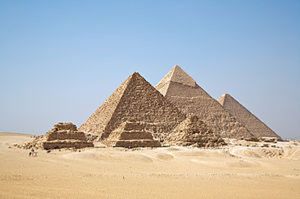“We were looking for ideas that would convey the same seriousness as when this body addresses Israel.”
 Geneva, April 20 – On the heels of a resolution ignoring the Jewish pedigree of the Temple Mount in Jerusalem, and accusing Israel of forging roots in the land by planting what it called fake graves, the United Nations Educational and Social Council (UNESCO) is considering a similar measure that explicitly denies anything Egyptian about the pyramids.
Geneva, April 20 – On the heels of a resolution ignoring the Jewish pedigree of the Temple Mount in Jerusalem, and accusing Israel of forging roots in the land by planting what it called fake graves, the United Nations Educational and Social Council (UNESCO) is considering a similar measure that explicitly denies anything Egyptian about the pyramids.
Council insiders with knowledge of the organization’s proceedings told reporters this afternoon that the general sense among UNESCO delegates was that they had to appear more balanced and consistent, especially regarding Israel, and would therefore entertain draft proposals in keeping with this week’s blatantly ahistorical and discriminatory resolution against Israel and Jewish history. A leading candidate for such a follow-up resolution involves the rejection of anything Egyptian about the pyramids, ancient monumental tombs for the Pharaohs and other important figures.
“It’s long been a trope that UN agencies single out Israel for negative attention,” conceded a delegate who spoke on condition of anonymity. “So we’ve been looking for ways to counterbalance that image. While it’s true that in general, UNESCO itself has generally taken a less staunch anti-Israel line, the most recent resolution makes that irrelevant, almost denying its own history. Appropriately enough.”
The delegate further revealed that in addition to denying an Egyptian connection to the pyramids, the Council was considering declaring the Great Wall of China not Chinese, though that idea has generated less support. Less likely scenarios also involve a UNESCO denial of indigenous status to Inuit populations in Canada and dismissal of the notion that Arabic bears any connection to ethnic Arabs. Given the sway Arab countries have in the organization, the latter proposal will in all probability not be advanced.
“We were looking for ideas that would convey the same seriousness as when this body addresses Israel,” explained another representative. “I think the proposals we’ve received so far do a good job of accomplishing that, each in its own way. Personally, I would have preferred to see more representation of South American culture, but the group working on the proposal to deny the Amazon as part of Brazil was sidetracked by the impeachment of the president there.”
Several other proposals never made it past the initial stages, as UNESCO personnel quickly realized the absurdity would not be as obvious as that of the original anti-Israel resolution. Among those were a denial that global warming has anything to do with human industrial activity, and a rejection of democracy as compatible with Islamic culture.




